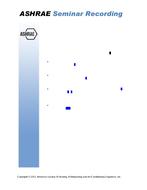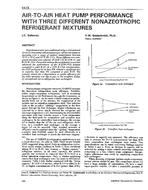Increased awareness of airborne disease transmission has renewed interest in the use of upper-room ultraviolet germicidal irradiation (UVGI) systems to disinfect air. A number of researchers have demonstrated experimentally the ability of such systems to inactivate airborne microorganisms. However, relatively little work has been done on the effect of room air mixing and ventilation strategy on the performance of upper-room UV systems. This paper presents a parametric study of a hypothetical upper-room UV system using a twozone mixing model to evaluate the effect of four ventilation regimes on air disinfection performance. The results of the study indicate that upper-room UVGI systems are most effective in applications where ventilation rates are low, being only of limited benefit in highly ventilated spaces. The paper also demonstrates that upper-room UVGI systems are best suited to applications that have good room air mixing.
Paper from IAQ 2004 — Critical Operations: Supporting the Healing Environment Through IAQ Performance Standards
Units: SI
Citation: IAQ Conference: IAQ 2004
Product Details
- Published:
- 2004
- Number of Pages:
- 10
- File Size:
- 1 file , 580 KB
- Product Code(s):
- D-22546


